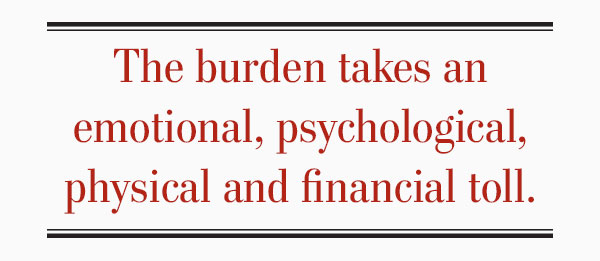
She is 88 years old. Her 93-year-old husband of 67 years is a veteran of the Second World War. Due to hearing loss attributable to his service, he receives a disability pension and other benefits under the Pension Act. They still live in their home.
A year ago, he fell and broke his left arm. While recovering, he came to rely more and more on a wheelchair, his unsteady legs strong enough only to transfer shakily between wheelchair, armchair, toilet and bed. A southpaw, he now eats—slowly—holding a fork in his tremulous right hand. A diabetic, he needs insulin injections and multiple pills four times a day. He has dementia.
This fictitious veteran used to care for himself just fine, and his wife used to have an independent life of her own, including plenty of time to spend gardening and creating paintings. Now her days revolve entirely around him. She makes his meals, organizes his meds, shaves him, cleans his dentures, maintains his morale, fails to defeat him at chess, responds to his every need, watches him live. Paid assistants do the heavy lifting, helping with showers and transportation, but she is his principal caregiver 24/7.
This in itself is not unusual—we all age and take care of each other. But as a disabled veteran, he is entitled to certain supports that non-veterans may not be. And there are thousands just like him—and her—across Canada.
Because he is covered by the Pension Act, he can apply for the Attendance Allowance, a financial benefit to pay for caregivers. Younger veterans who are covered by the Veterans Well-Being Act (formerly the New Veterans Charter) can apply for a similar but less generous benefit.

On April 1, a new veterans’ benefit was introduced under the Veterans Well-Being Act. Well, it’s new in name and in certain details. The Caregiver Recognition Benefit replaces the Family Caregiver Relief Benefit, in effect under the NVC since late 2015. The latter provided $7,238 tax-free paid annually to otherwise unpaid caregivers; the new benefit provides $1,000 tax-free monthly.
To qualify, a veteran must have a disability award and associated assistance for this injury or illness and a need for ongoing care, which includes help with specific activities of daily living.
Anyone who regularly looks after a sick, elderly or disabled person knows that caregiving can be an all-consuming responsibility. People often do it automatically, making sacrifices and not expecting compensation, but the burden takes an emotional, psychological, physical and financial toll. The Caregiver Recognition Benefit relieves some of the financial burden, at least.
However, it still falls short of what The Royal Canadian Legion was recommending: reinstatement of the Attendance Allowance from the Pension Act. That allowance ranges from $3,549 to $22,173.84 annually, depending on the extent of attendance required.
The new measure still does not adequately compensate a caregiver having to give up their job to support a disabled veteran. The amount provided does not even meet minimum-wage requirements.
Despite its shortcomings though, this is an important benefit for which every qualifying VAC client should apply.
Advertisement












